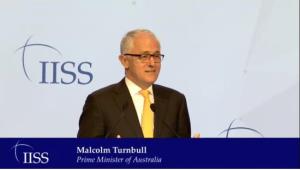For more than forty years our region has seen the greatest burst of economic growth and human advancement the world has ever seen.
Rapid economic growth has generated trade, investment and people flows which bind us all. But these same economic forces also bring political uncertainty, the acquisition of military capability and strategic ambition. Regional flash points are intensifying. Seemingly interminable conflicts in the Middle East and Africa; the sickening insanity of terrorism; economic and border instability in Europe; foreign interference across the democratic world; and a deeper level of political alienation and economic nationalism than we’ve seen since the 1930s.
The Internet and the digital technologies it has enabled are breaking down national boundaries and distance. Billions of people now have in their pocket a device that potentially connects them to everybody else in the world. Not so long ago only States and large corporations had megaphones powerful enough to address a nation - now a tweet or youtube video can reach millions, if not billions, and do so in seconds.
And reflect on the pace of these changes. The first iphone was launched in 2007, Facebook, with 1.5 billion accounts worldwide, began in a Harvard dorm in 2004 - it has 200 million accounts in India and 100 million in Indonesia alone. Technology has connected local aspirations and grievances with global movements. Hyperconnectivity has amplified the reach and power of non-state actors, forcing us to reassess how we, as nation states, assert and defend our sovereign interests. Last month’s ransomware cyberattacks confirmed that the world is still coming to terms with the new threats and vulnerabilities. In this brave new world we cannot rely on great powers to safeguard our interests.
We have to take responsibility for our own security and prosperity while recognising we are stronger when sharing the burden of collective leadership with trusted partners and friends. The gathering clouds of uncertainty and instability are signals for all of us to play more active roles in protecting and shaping the future of this region. I believe that the Indo-Pacific, as the most dynamic region, is well-placed economically, strategically, and culturally to shape and drive the global response.
This is the premise of my address tonight.
|

